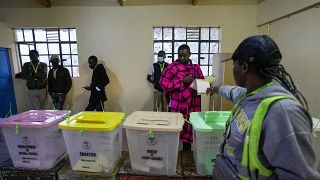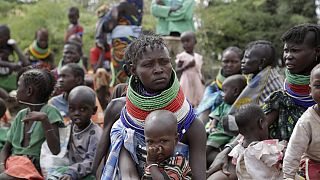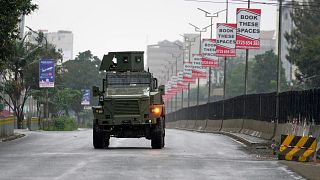Kenya
Northern Kenya has not seen a drop of rain in three years. In this dusty desert, there are only wild berries to eat.
Loka Metir feeds her five children with them, even though she knows it makes them sick. "It's the only way to survive," explains this mother from Purapul, a hamlet of thatched huts located two days' walk from the nearest town in arid Marsabit County.
The Horn of Africa is experiencing its worst drought in 40 years. At least 18 million people are facing extreme hunger.
Hunger affects 4 million people in Kenya, which is in the midst of an election campaign before a high-stakes presidential election on August 9.
In the northern desert regions, nearly 950,000 children under the age of five and 134,000 pregnant and lactating women are acutely malnourished, according to official figures from June.
In the three hardest-hit counties, including Marsabit, conditions border on starvation.
- "Under the carpet"
Already hit by the coronavirus pandemic, East Africa's largest economy will see its recovery hampered by drought, compounded by the impact of the war in Ukraine, the World Bank warned last month.
Yet drought is barely on the candidates' agenda, overshadowed by the problems of living costs.
In the big cities, people have threatened to boycott the elections with cries of "no food, no elections" if the prices of essential goods (foodstuffs, petrol, etc.) do not fall.
The plight of Kenya's far north has been "swept under the rug," says economist Timothy Njagi of the Tegemeo Institute for Agricultural Policy and Development in Nairobi.
"As this is an election year, we would have expected it to be a key issue," he says.
Four consecutive seasons of insufficient rainfall have created the driest conditions since the early 1980s.
Rivers and wells have dried up, pastures have turned to dust, causing the death of more than 1.5 million head of livestock in Kenya alone.
- Forgotten land -
Animal carcasses litter the rocky expanses around Purapul, where pastoralist families struggle to survive without milk, meat, or currency for food.
Iripiyo Apothya has watched her goats lose weight and then die.
"Now I eat what the monkeys eat," the 73-year-old sighs as she holds up a handful of berries that she has boiled and reduced to a bitter paste: "But even that is running out. What can we do?"
The village is isolated and, as is often the case in these forgotten northern regions, there is no school, no road, no store, no clinic. The nearest town, Loiyangalani, is 60 kilometers away.
The two main presidential candidates, William Ruto and Raila Odinga, came by helicopter to campaign in these drought-stricken areas, promising infrastructure and development. But their stopover was brief in these sparse vote pools.
The former has been vice-president for nearly ten years, the latter supported by the outgoing president. "So it's a lose-lose situation for anyone who talks about it," says Karuti Kanyinga of the University of Nairobi's Institute of Development Studies.
For Claire Nasike of Greenpeace Africa, both candidates' promises to invest in water supply and agriculture remain very vague. "Concrete details on how they will address the climate crises have not been addressed," she summarizes.
- "We are dying" -
Despite its historic magnitude, this drought - which could continue into 2023 if predictions of an upcoming failed rainy season hold true - is also not attracting the attention of the international community.
An appeal for aid funds for Ukraine has raised $1.92 billion, nearly 86% of its target, according to the UN. The much smaller appeal for the drought in Kenya was only 17% filled.
Under an acacia tree, a single doctor examines dozens of mothers and infants during his bi-monthly visit to Purapul.
"The kind of aid we are providing is a drop in the bucket," says James Jarso of the NGO World Vision, one of the few charities providing aid on the ground.
The government says it has spent more than 9 billion Kenyan shillings ($76 million) since the drought was declared a national disaster in September.
"We are going through a difficult economic time. We are doing all we can within the government's means to support the communities," said Steven Mavina, deputy reeve of Loiyangalani County.











02:30
Morocco’s oases struggle to survive amid growing desertification
01:01
Kenya: Visa-free travel now available for many African and Caribbean countries
00:22
Boniface Kariuki, a Kenyan mask vendor shot at close range laid to rest
11:17
Bridging the legal gap in Africa’s digital boom {Business Africa}
02:06
UN report reveals 4.6 million people struggling with food insecurity
Go to video
First Malaria treatment for babies approved